Who Benefits from the World Cup?
It is virtually impossible to hold an international sporting event without drawing criticism. The 2014 FIFA World Cup in Brazil is no different. With less than a year to go before the first match and five countries already qualified, considerable controversy surrounds the World Cup development in Brazil.
Over $13 billion has been allocated for development in the country, largely targeted toward the building and renovation of stadium. Brazil made a seemingly forward-thinking move by choosing to integrate green technology into the construction projects. The projects have since come under fire for employing technology that requires foreign goods and labor to install. Maintenance of the stadiums is estimated at some 10 percent of the total cost of construction, a burden to be shouldered by the people of Brazil for the foreseeable future. This is just the tip of the controversy.
Few of the funds has been targeted at infrastructure projects (transportation and municipal services), which would provide more long-term benefits to Brazilians than stadiums which have unclear viability in the future. Indeed, optimized infrastructure is crucial to the success of the event. The lack of improvements, coupled with the large crowds the World Cup is known for are disconcerting to many involved.
Decisions concerning construction projects seem small when weighed against the tales of human rights abuses emerging from the development controversy. Construction projects are estimated to be displacing over 170,000 people across the country, according to the Americas Program of the Center for International Policy. Displaced populations are generally poor, low-income people, and reports of unfair compensation for relocation and eviction under violent duress are rampant.
Meanwhile, workers are also complaining of unfair working conditions. Under the guise of restrictive deadlines for completion from FIFA, project oversight has pushed workers into dangerous working environments, sub-standard pay, and forced, uncompensated overtime. Conditions have led workers on many construction sites to strike, demanding the basic amenities and rights that befit construction projects on the world stage. These strikes are unlikely to sway the hearts of employers, who can easily fill in the gaps with the next willing employee.
Finally, the regulations of FIFA itself are cause for concern. One of the stipulations of the organization is that normal local laws be temporarily suspended during the course of the event. In the case of Brazil, that means that FIFA establishes a dominant grip on the merchandising and broadcasting of the event, with a no-compete clause from local sources. In addition, the Brazilian prohibition against sale of alcoholic beverages at sports events will vanish during the World Cup. You can learn more about FIFA and its regulations at www.worldcupfreebet.net where there is lots of information about the upcoming World Cup. There is a good deal of trepidation surrounding that, in particular. Alcohol and soccer are notoriously deadly and violent when combined and local law enforcement worry about damage to property and person that may result.
Shortly after the World Cup, Brazil is set to host the 2016 Summer Olympics, which promises to magnify these troubling trends. For the sake of the country, citizens of Brazil and the world are hoping for the Brazilian government to support global events and governmental and humanitarian concerns at the same time.
Over $13 billion has been allocated for development in the country, largely targeted toward the building and renovation of stadium. Brazil made a seemingly forward-thinking move by choosing to integrate green technology into the construction projects. The projects have since come under fire for employing technology that requires foreign goods and labor to install. Maintenance of the stadiums is estimated at some 10 percent of the total cost of construction, a burden to be shouldered by the people of Brazil for the foreseeable future. This is just the tip of the controversy.
Few of the funds has been targeted at infrastructure projects (transportation and municipal services), which would provide more long-term benefits to Brazilians than stadiums which have unclear viability in the future. Indeed, optimized infrastructure is crucial to the success of the event. The lack of improvements, coupled with the large crowds the World Cup is known for are disconcerting to many involved.
Decisions concerning construction projects seem small when weighed against the tales of human rights abuses emerging from the development controversy. Construction projects are estimated to be displacing over 170,000 people across the country, according to the Americas Program of the Center for International Policy. Displaced populations are generally poor, low-income people, and reports of unfair compensation for relocation and eviction under violent duress are rampant.
Meanwhile, workers are also complaining of unfair working conditions. Under the guise of restrictive deadlines for completion from FIFA, project oversight has pushed workers into dangerous working environments, sub-standard pay, and forced, uncompensated overtime. Conditions have led workers on many construction sites to strike, demanding the basic amenities and rights that befit construction projects on the world stage. These strikes are unlikely to sway the hearts of employers, who can easily fill in the gaps with the next willing employee.
Finally, the regulations of FIFA itself are cause for concern. One of the stipulations of the organization is that normal local laws be temporarily suspended during the course of the event. In the case of Brazil, that means that FIFA establishes a dominant grip on the merchandising and broadcasting of the event, with a no-compete clause from local sources. In addition, the Brazilian prohibition against sale of alcoholic beverages at sports events will vanish during the World Cup. You can learn more about FIFA and its regulations at www.worldcupfreebet.net where there is lots of information about the upcoming World Cup. There is a good deal of trepidation surrounding that, in particular. Alcohol and soccer are notoriously deadly and violent when combined and local law enforcement worry about damage to property and person that may result.
Shortly after the World Cup, Brazil is set to host the 2016 Summer Olympics, which promises to magnify these troubling trends. For the sake of the country, citizens of Brazil and the world are hoping for the Brazilian government to support global events and governmental and humanitarian concerns at the same time.

